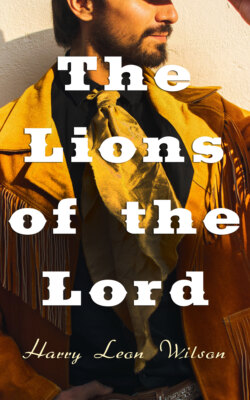Читать книгу The Lions of the Lord - Harry Leon Wilson - Страница 3
На сайте Литреса книга снята с продажи.
Foreword
ОглавлениеTable of Contents
In the days of ’49 seven trails led from our Western frontier into the Wonderland that lay far out under the setting sun and called to the restless. Each of the seven had been blazed mile by mile through the mighty romance of an empire’s founding. Some of them for long stretches are now overgrown by the herbage of the plain; some have faded back into the desert they lined; and more than one has been shod with steel. But along them all flit and brood the memory-ghosts of old, rich-coloured days. To the shout of teamster, the yell of savage, the creaking of tented ox-cart, and the rattle of the swifter mail-coach, there go dim shapes of those who had thrilled to that call of the West;—strong, brave men with the far look in their eyes, with those magic rude tools of the pioneer, the rifle and the axe; women, too, equally heroic, of a stock, fearless, ready, and staunch, bearing their sons and daughters in fortitude; raising them to fear God, to love their country,—and to labour. From the edge of our Republic these valiant ones toiled into the dump of prairie and mountain to live the raw new days and weld them to our history; to win fertile acres from the wilderness and charm the desert to blossoming. And the time of these days and these people, with their tragedies and their comedies, was a time of epic splendour;—more vital with the stuff and colour of life, I think, than any since the stubborn gray earth out there was made to yield its treasure.
Of these seven historic highways the one richest in story is the old Salt Lake Trail: this because at its western end was woven a romance within a romance;—a drama of human passions, of love and hate, of high faith and low, of the beautiful and the ugly, of truth and lies; yet with certain fine fidelities under it all; a drama so close-knit, so amazingly true, that one who had lightly designed to make a tale there was dismayed by fact. So much more thrilling was it than any fiction he might have imagined, so more than human had been the cunning of the Master Dramatist, that the little make-believe he was pondering seemed clumsy and poor, and he turned from it to try to tell what had really been.
In this story, then, the things that are strangest have most of truth. The make-believe is hardly more than a cement to join the queerly wrought stones of fact that were found ready. For, if the writer has now and again had to divine certain things that did not show,—yet must have been,—surely these are not less than truth. One of these deductions is the Lute of the Holy Ghost who came in the end to be the Little Man of Sorrows: who loved a woman, a child, and his God, but sinned through pride of soul;—whose life, indeed, was a poem of sin and retribution. Yet not less true was he than the Lion of the Lord, the Archer of Paradise, the Wild Ram of the Mountains, or the gaunt, gray woman whom hurt love had crazed. For even now, as the tale is done, comes a dry little note in the daily press telling how such a one actually did the other day a certain brave, great thing it had seemed the imagined one must be driven to do. Only he and I, perhaps, will be conscious of the struggle back of that which was printed; but at least we two shall know that the Little Man of Sorrows is true, even though the cross where he fled to say his last prayer in the body has long since fallen and its bars crumbled to desert dust.
Yet there are others still living in a certain valley of the mountains who will know why the soul-proud youth came to bend under invisible burdens, and why he feared, as an angel of vengeance, that early cowboy with the yellow hair, who came singing down from the high divide into Amalon where a girl was waiting in her dream of a single love; others who, to this day, will do not more than whisper with averted faces of the crime that brought a curse upon the land; who still live in terror of shapes that shuffle furtively behind them, fumbling sometimes at their shoulders with weak hands, striving ever to come in front and turn upon them. But these will know only one side of the Little Man of Sorrows who was first the Lute of the Holy Ghost in the Poet’s roster of titles: since they have lacked his courage to try the great issue with their God.
New York City, May 1st, 1903.
